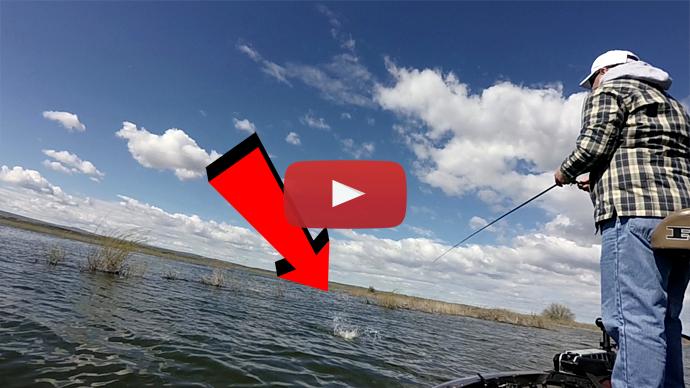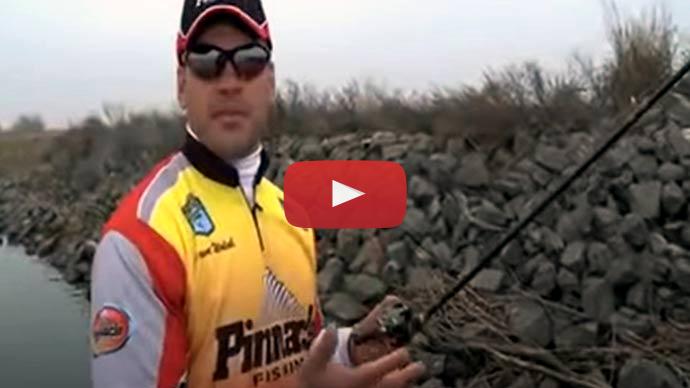Glenn: Look at that. Good fish. It's a good fish, honey.
Keri: Gotta catch up with him, he's heading out here.
Glenn: He's going right out to deep sea. Nice.
Keri: He hit it right when it hit the water up there right at the edge.
Glenn: He was right there. Believe it or not, in this cold water. Do you want me to grab it for you?
Keri: Yeah. Can you get the net? Please?
Glenn: Net coming up.
Keri: Hurry, hurry, hurry. He is not happy.
Glenn: Well that works.
Keri: Well that does work. Look at that. Wow, he's a nice one.
Glenn: That's a good fish. Good fish.
Keri: Nice. Hit it right when it hit the water right at the end.
Glenn: Yeah, I saw where you cast.
Keri: Oh, he's heavy.
Glenn: Oh yeah. He's a good one.
Keri: He's got some weight to him too. Hi guy. Got you right in the nose. You are cold. Take a picture.
Glenn: Cold water fishing.
Okay, here's a great question about fishing during the winter months. "Hey, Glenn, you got any tips for fishing when the water temperatures are really cold, say in the upper 30s all the way up to the upper 40s?" Yeah, winter fishing can be tough, relatively speaking. See, in colder temperatures, the fish's metabolism is governed by water temperatures. So the colder the temperature it is, the less often they feed. Bass in cold water will feed maybe once every seven days, whereas fish in the peak of the summertime are eating several times a day. So during the wintertime, there's going to be just by virtue of that less bass that are willing to bite lures. So your bite is going to be less frequent. And you're not going to catch as many bass as you would in the summertime.
A lot of people lead us to believe that the bass are really lethargic and slow-moving. No, they're just as capable of moving as fast as they did in the summertime. But a lot of it is the baits that are moving. The forage that they're feeding on is slow-moving.
And so what you need to do is you're fishing relatively slow because that mimics what the bait fish and what they forage, say sculpin, for example, they move very slowly on the bottom. Those are the things the bass are targeting. So you're mimicking that rather than, you know, you need to fish slow because the bass moves slow. I just don't buy into that theory. A matter of fact, I've actually caught bass with crankbaits in colder temperatures, in 40 degree temperature and on spinnerbaits. I've actually caught fish on topwater in 42-degree temperature. But those are exceptions to the rule.
As a general rule, you need to fish slower, you need to be more methodical, and you need to really pay close attention. Your concentration needs to be at the highest it is during any day of the time of the year because those bites are going to be subtle because it's a slow moving bait. They're not going to come and annihilate it. They don't need to. They'll just pick it up and just swim off with it.
So stay focused, understand you're not going to catch as many fish, and by all means, wear warm gear to keep you warm in these coldest temperatures, and that will enable you to stay focused throughout the day.
If you have any questions for me, please, fire them at me at this email down below, or you can always shoot me a question on Facebook. For more tips and tricks like this, visit BassResource.com.



